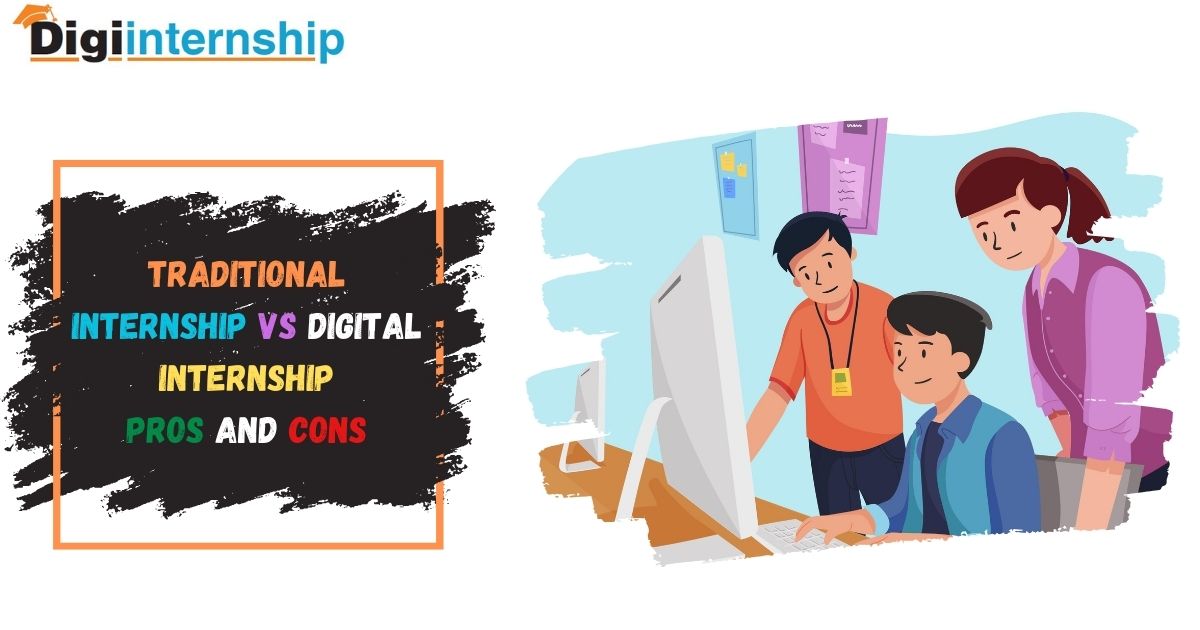
Comparing Traditional Internship vs Digital Internship-Pros and Cons can help you understand which might be a better fit for your goals and circumstances. Here’s a breakdown of the pros and cons for each:
Traditional Internships
Pros:
- In-Person Experience: Traditional Internships Provide direct interaction with colleagues and mentors, fostering networking and relationship-building.
- Hands-On Learning: Often involves more practical, hands-on tasks and projects that can provide valuable real-world experience.
- Structured Environment: Traditional internships usually offer a more structured schedule and clearer expectations, which can be beneficial for learning and development.
- Office Culture Exposure: Allows interns to experience and adapt to office culture, which can be important for future employment.
Cons:
- Geographical Limitations: Traditional Internships requires physical presence, which can limit opportunities if you’re not in the area or unable to relocate.
- Commute and Costs: Involves commuting and other costs like meals and work attire, which can be a financial burden.
- Limited Flexibility: Traditional internships typically have less flexibility in terms of working hours and remote work options.
- Potential for Less Individual Attention: With a larger group of interns or employees, individual attention and mentorship might be limited.
Digital Internships
Pros:
- Flexibility: Digital Internships Often allows for flexible working hours and the ability to work from anywhere, which can be great for balancing with other commitments.
- Cost-Efficient: Eliminates commuting and other associated costs, making it more accessible and affordable.
- Broader Opportunities: Digital Internships opens up opportunities to work with companies that are geographically distant, expanding the range of possible internships.
- Tech Skills Development: Provides experience with digital tools and remote working technologies, which are increasingly important in many fields.
Cons:
- Less Face-to-Face Interaction: Digital internships limit in-person interaction can make it harder to build relationships and network effectively.
- Distractions and Isolation: Working from home can lead to distractions and feelings of isolation, which may affect productivity and engagement.
- Communication Challenges: Digital Internships requires strong communication skills and self-discipline, as remote work can sometimes lead to misunderstandings or missed connections.
- Less Structured Learning: It may lack the structured training and mentorship found in traditional internships, depending on the organization.
CONCLUSION
In Conclusion, Both types of internships have their unique advantages and challenges, so the best choice depends on your personal preferences, career goals, and logistical considerations. Traditional Internship vs Digital Internship-Pros and Cons each offer distinct advantages and challenges, and the best choice depends on individual circumstances and career goals.
Traditional Internships excel in providing hands-on, in-person experience and a structured learning environment, which can be invaluable for networking and adapting to office culture. However, they come with geographical limitations, commuting costs, and less flexibility.
Digital Internships, on the other hand, offer greater flexibility, cost-efficiency, and access to a broader range of opportunities without geographical constraints. They also help develop important digital and remote working skills. However, they may lack the direct interpersonal interactions and structured mentorship of traditional internships, and can sometimes lead to isolation and communication challenges.
Ultimately, the decision should be based on what aspects of the internship experience are most important to you.Visit us at https://digiinternship.com/home-2/. If in-person interactions and structured learning are key, a traditional internship may be preferable. If flexibility, cost, and remote work skills are more important, a digital internship could be a better fit.



